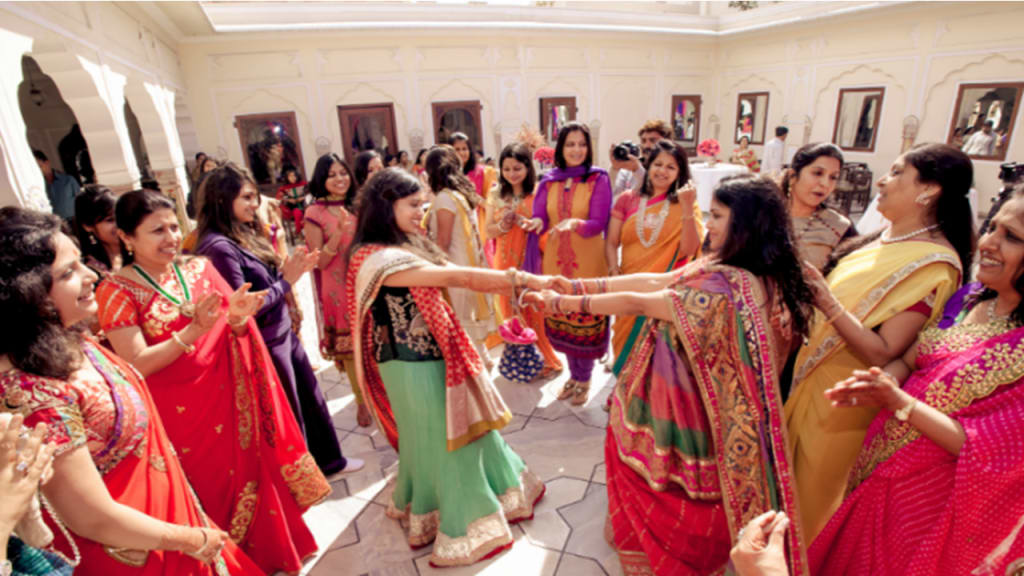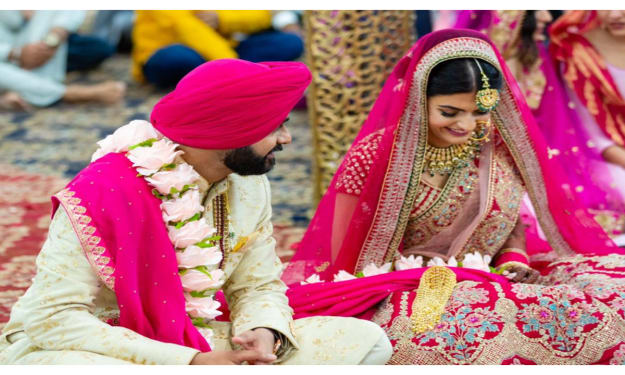Choal: The Majestic Ritual of Oil, Coins, and Shared Trust in the Majha Region of Punjab
Rituals of Punjabi Wedding

Introduction:
In the Majha region, nestled amidst the vibrant cultural landscape of Punjab, a unique ritual known as Choal takes center stage. This cherished custom, steeped in tradition and communal trust, involves a ritualistic offering of oil in a pot by the host, Nain, to the women present. In a beautiful gesture of reciprocity, the women place coins in the pot, adhering to a long-standing custom. Each woman then entrusts the cash to the knowledge of the house's owner, ensuring that it will be returned to her at the appropriate time. This article delves into the significance of Choal, shedding light on the cultural meaning behind this ritual, the symbolism it carries, and the bonds of trust it fosters within the community.
I. The Historical Context:
Choal finds its roots in ancient customs, where rituals served as a means of fostering unity, trust, and cooperation within the community. In the Majha region, where agricultural practices have historically thrived, communal gatherings held great importance. Choal emerged as a way to bring together women and create a shared sense of responsibility and trust among them.
II. The Symbolism of Oil and Coins:
A. Offering of Oil:
The act of pouring oil into a pot during Choal carries symbolic significance. Oil, known for its nourishing properties and its ability to bring light, represents abundance, prosperity, and well-being. The offering of oil is a gesture of goodwill and blessings, symbolizing the desire for prosperity and harmony for the entire community.
B. Placement of Coins:
The women's participation in Choal involves placing coins in the pot. These coins symbolize their contributions and their commitment to the community. It is a demonstration of their willingness to support and uplift one another, ensuring the collective welfare of the group. The act of placing coins also signifies the value placed on shared resources, communal harmony, and the spirit of generosity.
III. The Importance of Trust:
Choal epitomizes the power of trust within a community. Each woman entrusts her cash to the knowledge of the house's owner, creating a network of shared responsibility and accountability. This act embodies a deep sense of trust, as the women have faith that their contributions will be safely kept and returned to them when needed. Trust serves as the foundation of the Choal ritual, strengthening social bonds and fostering a sense of belonging within the community.
IV. Strengthening Community Ties:
Choal serves as a catalyst for community engagement and cohesion. The ritual brings together women from different households, forging connections, and fostering a sense of togetherness. It provides a platform for communication, exchange of ideas, and mutual support, strengthening the fabric of social relationships. Through Choal, the community is united in a shared endeavor, creating a sense of solidarity and collective responsibility.
V. Empowerment and Equality:
Choal promotes gender equality and empowers women within the community. By actively participating in the ritual and contributing to the pot, women assert their presence, their agency, and their economic independence. It highlights their vital role in the community's welfare and reinforces the importance of their voices and contributions.
VI. Customary Obligations and Reciprocity:
The Choal ritual establishes customary obligations and a sense of reciprocity among community members. Each woman brings the cash she placed in the pot to the knowledge of the house's owner, ensuring transparency and accountability. This practice instills a collective understanding that the contributed cash will be returned to its rightful owner when circumstances warrant it. The reciprocal nature of Choal strengthens the bonds of trust and cultivates an environment of mutual respect.
VII. Preserving Cultural Heritage:
Choal serves as a cultural anchor, preserving the unique customs and traditions of the Majhe region. Through the continued practice of this ritual, future generations are connected to their roots, fostering a sense of pride in their heritage. It acts as a conduit for passing down ancestral knowledge, reinforcing the significance of communal harmony, and upholding the values and beliefs cherished by the community.
Conclusion:
Choal, with its ritualistic offering of oil, placement of coins, and bonds of trust, embodies the essence of communal unity and shared responsibility in the Majhe region. This symbolic tradition carries deep cultural meaning, reinforcing the values of prosperity, generosity, and reciprocity. Through Choal, the community comes together, strengthened by the threads of trust, mutual support, and empowerment. As this ritual continues to be practiced and cherished, it serves as a testament to the enduring power of tradition, the importance of communal bonds, and the preservation of cultural heritage in the Majha region.
About the Creator
Dr. Amjad Ali Bhatti
Dr. Amjad Ali Bhatti is a multifaceted individual who has made significant contributions in the fields of research, translation, literature, and social activism.






Comments
There are no comments for this story
Be the first to respond and start the conversation.